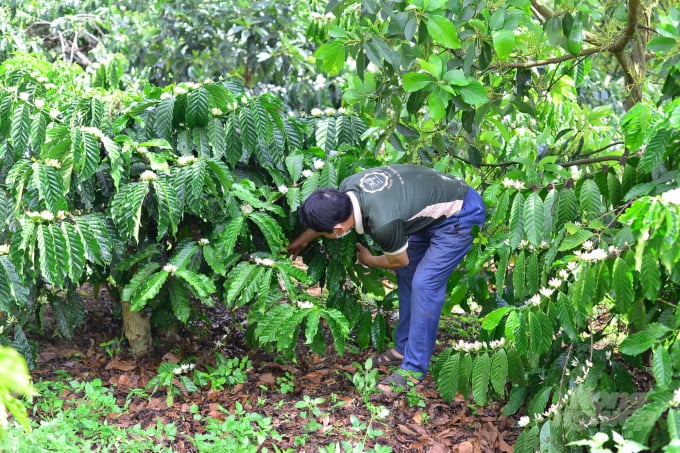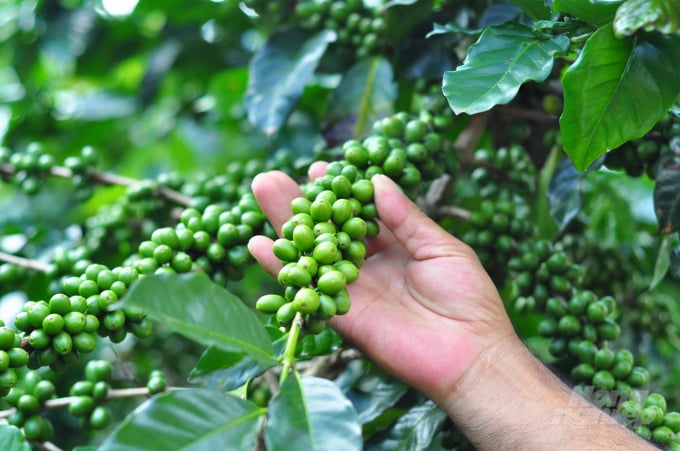November 27, 2025 | 01:15 GMT +7
November 27, 2025 | 01:15 GMT +7
Hotline: 0913.378.918
November 27, 2025 | 01:15 GMT +7
Hotline: 0913.378.918
When the sun and wind of mid-March peak dry season come rushing in, many coffee gardens in the land of Di Linh district are usually destined to suffer. However, the coffee garden of Mr. Do Duy Tung (village 8, Hoa Bac commune, Di Linh district, Lam Dong) still looks full of life. The young fruits begin to form beautiful long lines on the branches.
As shared by Mr. Tung, in recent years the price of agro-inputs for coffee production had constantly increased while the price of products is continuously in decline, putting the family into many difficult situations. In search of a way to reduce production costs, he did some research on organic production and learned about the self-compost process.

"In the past my family used inorganic fertilizers which cost approximately VND 40 million/ha/year. The application of inorganic fertilizers also led to an increase in labor costs" - Mr. Tung. Photo: Minh Hau.
With the support of agricultural officials, in 2020 Mr. Do Duy Tung began organic composting to fertilize his garden. Mr. Tung purchased soybean meal, probiotics and fish manure from fish farms in the area with the ambition to create a suitable fertilizer source that meets standard nutritional criteria. "This type of fertilizer helps plants absorb nutritions well and thrive. Thanks to this method the family has saved 50% of the fertilizer cost compared to inorganic fertilizers."
In a similar manner, Mr. Bach Van Pha in Tan Van commune, Lam Ha district, Lam Dong also found a "lifebuoy" by self-composting to reduce input costs for his family's 5.7 ha of coffee, saving hundreds of millions of dong on fertilizer each year.
His family used to depend on chemical fertilizers to grow coffee. In the first few crops the coffee grew strong and well, but later on the soil became more and more discolored and hardened, coffee in the garden also gradually withered, and the productivity and quality decreased severely.
After some research and studies, Mr. Pha decided to use coffee husks, agricultural by-products combined with Trichoderma and sugarcane to self-compost.

Mr. Pha composting organic fertilizers for the crops on his own. Photo: Minh Hau.
“Composting organic fertilizer by myself is difficult at first since I have to adhere to the mixing formula and be precise on the time. However after a few batches of compost, I slowly mastered the craft and didn't need to look at books or notes anymore," said Mr. Pha.
Along with the use of self-composting organic fertilizers, Mr. Tung's family now focuses on developing the garden in the organic direction.
“Developing the organic coffee model takes a lot of effort at the beginning stage due to a sharp decrease in productivity, but the good result gradually shows itself over time. In the 2020 crop my family only yielded 6 tons/ha, while inorganic fertilizer coffee was 8 - 10 tons/ha. In the 2021 crop, the yield increased to 8 tons/ha, and now I’m expecting an output of 10 tons/ha in the 2022 crop.”
Mr. Tung's family, together with other households in the village, has established an organic coffee cooperative group with a total cultivation area of 5.6 ha. The members have built a buffer zone and developed the model according to organic standards such as zero chemical pesticides and fertilizers. "Although our cooperative group is fresh and young, our clean coffee products have been sought out by many purchasing hubs in Hanoi and Ho Chi Minh City, offering to underwrite at a price VND 12,000 higher than the market price."

Organic coffee produced by Mr. Tung's family holds superiority in terms of selling price on the market compared to other common types of coffee products. Photo: Minh Hau.
Green coffee which is produced following the conventional model is currently around VND 40,000 - 41,000/kg on the market while organic coffee produced by the households is VND 52,000 - 53,000/kg.
According to Mr. Bach Van Pha, many households in Lam Ha district still produce coffee the old way: abusive use of inorganic fertilizers and toxic pesticides. “This prolonged behavior soon leads to soil degradation and other negative impacts on the water and earth environment, and that also goes for the health of producers and consumers.”
Translated by Samuel Pham
/2025/11/26/4909-2-154329_878.jpg)
(VAN) Pearl grouper farming in HDPE cages not only delivers economic efficiency but also contributes to protecting the environment, creating jobs, and promoting marine-based experiential tourism.

(VAN) The model of making a living under the forest canopy through the agroforestry system in Van Son commune, Bac Ninh province, is expected to generate an annual income of approximately VND 30 million/ha.

(VAN) Many enterprises in Can Tho are harnessing natural energy and reducing greenhouse gas emissions in their production processes, thereby contributing to the promotion of a sustainable green transition.
/2025/11/24/3536-2-112800_176.jpg)
(VAN) Dong Nai now has tens of thousands of hectares of forests certified for sustainable management, and this area will continue to be expanded in the coming period.

(VAN) Vinh Ha hamlet (Dai Xuyen commune, Hanoi) is shifting away from small-scale farming as households adopt bioscurity into their breeder chicken models.

(VAN) Heavy rains make aquatic species more vulnerable to disease. Proactive water management and high-tech systems help farmers prevent outbreaks and protect yields.

(VAN) Greenhouses are shifting production mindsets in Binh Lu commune, enabling farmers to ‘weather the sun and rain’ and secure stable vegetable harvests throughout the year.